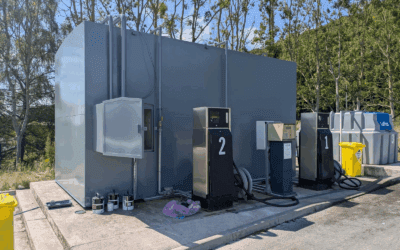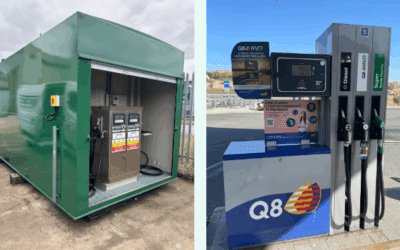
HVO Fuel for Public Service Vehicles
Hydrotreated Vegetable Oil (HVO) fuel is gaining recognition as a crucial interim solution for public service vehicles, including fire engines, ambulances, and refuse trucks. This renewable diesel alternative is especially relevant given the current challenges faced by the electric vehicle (EV) industry. As highlighted in The Times, policy shifts and infrastructure limitations have significantly disrupted the automotive sector. These challenges underscore the urgent need for reliable and eco-friendly alternatives like HVO fuel. Offering compatibility with existing diesel engines and substantially reducing greenhouse gas emissions, HVO fuel serves as a practical bridge in the ongoing transition to electric vehicles.
Current Challenges in the EV Industry
The EV industry is currently facing numerous hurdles, including delayed policy implementation, high costs, and inadequate infrastructure. These issues have led to a decline in consumer confidence and slowed adoption rates, particularly among private buyers. The delay in the ban on petrol and diesel cars has further complicated the industry’s efforts to meet stringent environmental targets. This situation highlights the ongoing debate between HVO fuel and electric vehicles in terms of immediate applicability and long-term sustainability. Given these challenges HVO fuel for public service vehicles could be a good interim alternative.
HVO Fuel as a Sustainable Fuel Solution
HVO fuel presents itself as a sustainable and immediate alternative to traditional diesel. It ensures that public service vehicles can continue to operate efficiently and in an environmentally friendly manner while the EV market and infrastructure mature. This dual capability of HVO fuel supports operational continuity and contributes to reducing the overall carbon footprint, making it a vital consideration during this transitional period.
What is HVO Fuel?
Hydrotreated Vegetable Oil (HVO) is a type of renewable diesel produced through the hydrogenation of vegetable oils and animal fats. This process involves treating these raw materials with hydrogen at high temperatures and pressures, resulting in a clean-burning fuel free from impurities commonly found in traditional biodiesel. Unlike conventional biodiesel, HVO can be used directly in existing diesel engines without any modifications, making it a highly versatile and practical fuel option.
Environmental Benefits of HVO Fuel
One of the primary advantages of HVO fuel is its significant reduction in greenhouse gas emissions compared to fossil fuels. HVO fuel can lower CO2 emissions by up to 90%, contributing substantially to efforts aimed at combating climate change. Additionally, it produces fewer particulates and nitrogen oxides, which are harmful pollutants affecting air quality. These characteristics position HVO fuel for public service vehicles as one of the most promising sustainable fuel solutions available today, offering immediate environmental benefits while the infrastructure and technology for electric vehicles continue to develop.
Advantages of HVO Fuel for Public Service Vehicles
Compatibility with Existing Infrastructure
HVO fuel’s seamless compatibility with existing diesel engines is a key benefit making HVO fuel for public service vehicles a highly viable option. Public service vehicles can switch to HVO fuel without requiring any modifications to their current infrastructure. This ease of transition is particularly beneficial for municipalities and service providers looking to reduce their environmental impact without incurring the high costs associated with upgrading or replacing entire fleets.
Reduction in Greenhouse Gas Emissions
By using Hydrotreated Vegetable Oil, public service vehicles can lower their CO2 emissions by up to 90%, making it a green fuel for heavy vehicles that prioritises both operational efficiency and environmental responsibility. This reduction in emissions is crucial for urban areas where public service vehicles are in constant operation, helping to improve air quality and meet stringent environmental regulations.
Performance and Reliability for Emergency Services
Public service vehicles, especially those used in emergency services, require high performance and reliability. HVO fuel offers similar energy content and performance characteristics to conventional diesel, ensuring that vehicles like fire engines and ambulances can operate efficiently under demanding conditions. Several fire departments in Europe have successfully integrated HVO fuel into their fleets, reporting no compromise in performance while benefiting from reduced emissions and a lower carbon footprint.
HVO Fuel vs. Electric Vehicles
Policy Changes and Their Impact
Recent policy shifts have significantly impacted the automotive industry’s trajectory towards sustainability. The UK government’s decision to delay the ban on the sale of new petrol and diesel cars from 2030 to 2035 has caused considerable disruption. This policy change has created uncertainty within the industry, leading to decreased consumer confidence and investment in EV technology.
Conversely, HVO fuel remains unaffected by these delays. It is a drop-in solution that can be utilised immediately within existing diesel infrastructure, offering a degree of stability and continuity amidst policy fluctuations.
Comparison of Costs and Infrastructure Requirements
The cost and infrastructure requirements for EVs and HVO fuel differ markedly. Electric vehicles, while environmentally promising, require significant upfront investment in both the vehicles themselves and the supporting charging infrastructure. The cost of EVs remains relatively high, with many models priced above £40,000, and the rollout of charging stations, although improving, still faces regional disparities.
In contrast, HVO fuel offers a more cost-effective transition solution. It can be used in existing diesel engines without the need for extensive modifications, saving both time and money. Public service fleets, such as fire engines, ambulances, and refuse trucks, can switch to HVO fuel seamlessly, leveraging existing refuelling infrastructure.
Benefits of HVO as a Transitional Fuel
HVO fuel provides several key benefits as a transitional fuel during the shift to full electrification:
- Immediate Implementation: HVO can be used immediately in existing diesel engines, allowing for a swift transition without the wait for new infrastructure.
- Environmental Impact: HVO significantly reduces greenhouse gas emissions and other pollutants compared to traditional diesel, contributing to better air quality and lower carbon footprints.
- Operational Continuity: Public service vehicles, which require high reliability and performance, can continue to operate efficiently on HVO fuel, ensuring that essential services remain uninterrupted.
Case Studies and Real-World Applications
Stockholm Public Transport
Stockholm’s public transport authority, SL, has integrated HVO fuel into its bus fleet. This initiative is part of the city’s broader strategy to reduce emissions and improve air quality. SL’s buses have been running on HVO fuel since 2016, providing a cleaner alternative to diesel without requiring modifications to the existing fleet.
Belfast City Council
More than 200 of Belfast City Council’s fleet vehicles, including heavy goods vehicles (HGVs) and street sweepers, have transitioned to Hydrotreated Vegetable Oil (HVO) fuel following a successful trial. This switch has significantly reduced carbon emissions and improved air quality in the city. The initiative aligns with Belfast’s broader climate action plans, promoting sustainability and environmental responsibility
Conclusion
Hydrotreated Vegetable Oil (HVO) fuel has emerged as a crucial interim solution for public service vehicles amidst the current challenges faced by the electric vehicle (EV) industry. Its seamless compatibility with existing diesel engines, significant reduction in greenhouse gas emissions, and reliable performance make it an ideal choice for critical services like fire engines, ambulances, and refuse trucks. Various case studies from cities like Stockholm, Helsinki, and Rotterdam have demonstrated the practical benefits and positive outcomes of adopting HVO fuel, including improved air quality and operational efficiency.
The Role of HVO Fuel in Sustainable Transportation
HVO fuel plays an essential role in the transition to sustainable transportation. While the long-term goal is to fully transition to electric vehicles, the current infrastructural and economic challenges make immediate adoption difficult. HVO fuel offers a viable, environmentally friendly alternative that supports public service operations without the need for extensive modifications or high costs. Its ability to significantly reduce emissions while maintaining performance ensures that public services can continue to function efficiently during this transitional period.
Call to Action for Further Engagement
The benefits of HVO fuel for fleets are clear, and its role as a sustainable fuel solution cannot be overstated. Municipalities, fleet operators, and policymakers are encouraged to consider the integration of HVO fuel into their public service vehicles to achieve immediate environmental and operational benefits. For those interested in exploring how HVO fuel can be implemented in their fleets, further research








